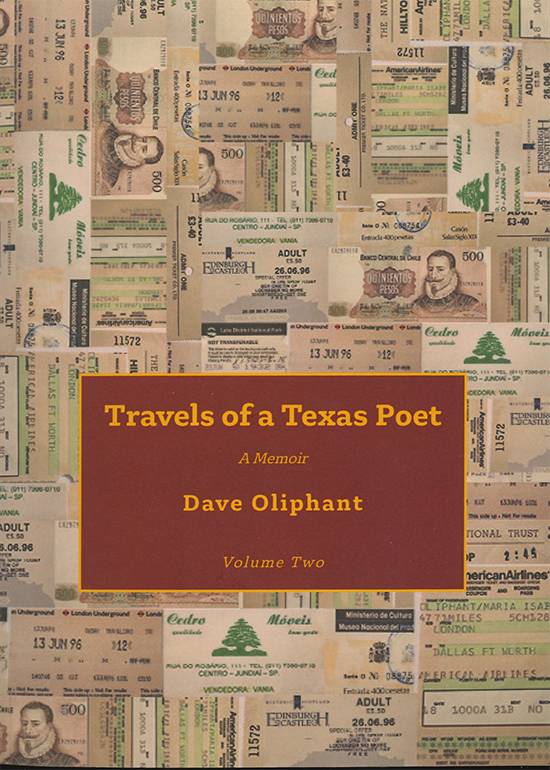
Travels of a Texas Poet: Volume 2
by Dave Oliphant
Austin: Alamo Bay Press, 2022.
304 pp. $33.00 Paperback
Reviewed by
Clara Grosenbacher
“The book ends up being not just a mere travel diary but also a remembrance of the time Oliphant spent with his wife. Readers will find a long narrative detailing the travels and experiences of a man of letters that connect him back to his homeland and to the love of his life.”
Dave Oliphant has published books on music, poetry, and Spanish translations, but his aim in writing, as he says, is not to sell books or to make a career. His work, as he puts it, “serves no practical purpose, but it gives (him) great satisfaction.” Travels of a Texas Poet: Volume 2 is no exception. Oliphant continues his meditation on life, language, and culture in the form of a travelogue, but he admits that, were he to write for money, he “suppose(s) he would starve, or have to do journalism rather than write poetry or literary essays.” He writes not for an audience but for himself. “To me any trip means so much more when I try to capture in words what I have seen and heard and smelled and tasted,” he writes. His main purpose in writing is remembrance.
Like Virginia Woolf’s novels, Oliphant’s book meditates on the ordinary occurrences of daily life through his travels, even on the mundane details such as the produce at the grocery store in Brazil or the people he sat behind on his flight to Chile. Many readers might wonder what the point of all this is, as the text at times seems to be nothing more than reminiscence on unimportant details. Closer inspection, however, reveals that the text carries two major themes.
When Oliphant discusses these small day-to-day happenings, he frequently relates them to literature and culture. These references create a recurring theme of similarity between cultural identities, particularly between his as a Texan and those in the country he is visiting. He shows how literature and culture in Texas overlap in many ways with Brazil and Chile. The intersection of Texas with other countries through language and literature is a prominent theme.
The second feature Oliphant focuses on is the presence of his wife, María. She is a constant presence throughout the book, even in instances where she is not the focus. He states that no matter where he travels to, he “must have poetry, music, and María,” which makes reading the book’s last part all the more emotional. After detailing the time the two spent together in Chile in 2011, Oliphant spends the book’s fourth and final chapter grieving María’s death through a series of poems. After expressing his initial wave of heartbreak, in which he wondered why and how he could “seek words to take her features’ place,” he ends the book with one last poem, in which he describes the solace he has found again in poetry and his hope that “words may bring again her quiet charm.” In this instance, he writes not just for himself but also for his wife and her memory. His words express his heartbreak and commemorate his love for her.
The book ends up being not just a mere travel diary but also a remembrance of the time Oliphant spent with his wife. Readers will find a long narrative detailing the travels and experiences of a man of letters that connect him back to his homeland and to the love of his life. This is tedious at times but emotional nonetheless. Oliphant takes readers on a long journey that spans years, countries, and cultures. It carries thoughtful observations on culture and life that not only express the nuanced similarities and differences between Texas and Latin America, but it also plays an important role in the author’s remembrance of his wife.
Clara Grosenbacher is a graduate student at Texas State University.
